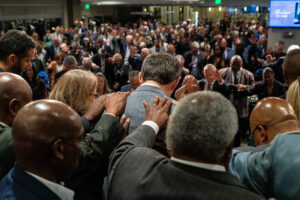
 The atmosphere tingles with anticipation. Ordnance crews on the flight deck of the USS Harry S. Truman work quickly and efficiently to load guided missiles into dozens of aircraft, including F/A-18 Hornets and F-14 Tomcats. Hours from now, under cover of darkness, fighter pilots will carry them to final destinations — targets located somewhere in western Iraq.
The atmosphere tingles with anticipation. Ordnance crews on the flight deck of the USS Harry S. Truman work quickly and efficiently to load guided missiles into dozens of aircraft, including F/A-18 Hornets and F-14 Tomcats. Hours from now, under cover of darkness, fighter pilots will carry them to final destinations — targets located somewhere in western Iraq.
Below the flight deck, it looks much different than what is happening above. Sailors walk quickly through the various passages and hatches of the ship, tending to the specific jobs and duties they've been trained to do. Along the way, many of them greet a familiar and often comforting figure aboard ship, Commander Doyle W. Dunn, command chaplain for the aircraft carrier.
Dunn, a Southern Baptist and graduate of Southwestern Baptist Theological Seminary in Texas, oversees a staff of three junior chaplains and fifteen lay leaders through the ship's religious ministries department for the 5,000 sailors and Marines on board. It is his responsibility to develop religious services and programs for more than two-dozen different recognized religions. Deployed with a unit of Marines during Desert Shield/Desert Storm in the early 1990s, Dunn admits that it is quite different today in his role on the Truman, a position he has held since early February.
"The jobs we do on ship are what we do every time this ship moves anywhere," Dunn said. "Cooks cook, supply folks fulfill their responsibilities. With the exception of aviators, when combat starts, it's the same job."
The sailors and Marines currently on board the USS Harry S. Truman don't have a lot of downtime. The young enlisted men and women typically work seven days a week, twelve hours a day at their various responsibilities and tasks. For officers, it can be eighteen hours a day, overseeing and managing the enlisted. Many look forward to the Sunday services led by the ship's chaplains and the fresh encouragement that will get them through another long, intense week.
Ministry opportunities on board are as varied as the denominations and religions represented. Numerous church services, Bible studies, and even choir practices are available throughout the week. Sunday, in particular, is reserved for worship and rest.
Five services are offered throughout the day on any given Sunday. A Protestant liturgical service, a contemporary Protestant worship service, a gospel service, and two Catholic masses are offered to minister to sailors of different denominations and faiths. Many take advantage of it.
The contemporary Protestant service, offered at "ten-hundred," is in full swing in the foc'sle – the bow of the ship just under the ship's flight deck. More than 120 people are gathered on this particular morning, singing joyfully and enthusiastically with the praise team led by a ship's supply officer. Many raise their hands and close their eyes, seeking one-on-one time with God even as the catapults above launch another group of planes for short mission training flights. The sudden engine roars and bone-crunching thuds offer a not-so-subtle reminder to the group that Sundays, unfortunately, aren't days of rest for everyone.
Chaplain Doyle Dunn gives the week's sermon. He talks about Peter stepping out of the boat to be with Jesus.
"We've all felt fear and we give it lots of different titles — apprehension, anxiety. There's a lot of fear out there," Commander Dunn says. "Having courage doesn't mean you've conquered every fear, but holding on to fear can keep us frozen in place. It keeps us from doing basic things to survive."
Dunn and the ship's other chaplains and lay leaders — not just in Sunday sermons, but in ministry throughout the week-regularly remind sailors far from home about the courage Christ gives, along with comfort and reassurance.
Courage is taking fear and pushing ahead in spite of it, Dunn notes in his sermon.
"When we turn to Christ for a problem and ask Him for help, He never refuses," he affirms. "Courage is a discipline — a mental muscle that cuts a path through fear."
The chaplains on board take their calling seriously. Each has various departments they serve, offering encouragement and keeping a pulse on the morale of sailors.
"I see so many eighteen- and nineteen-year-old young men and women who come from broken homes and tough life experiences," Dunn reflected. "They join the military looking for a sense of purpose. This opens the door to share Jesus Christ with them. Every time I get a chance to see a sparkle of recognition in their eyes — well, that's what I live for."















